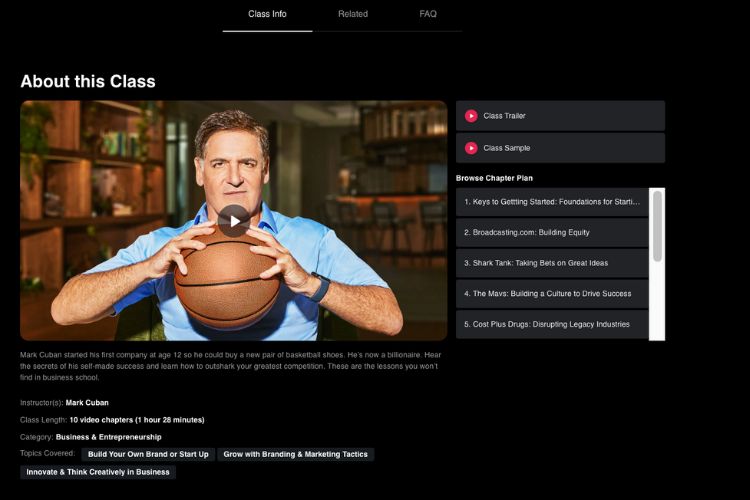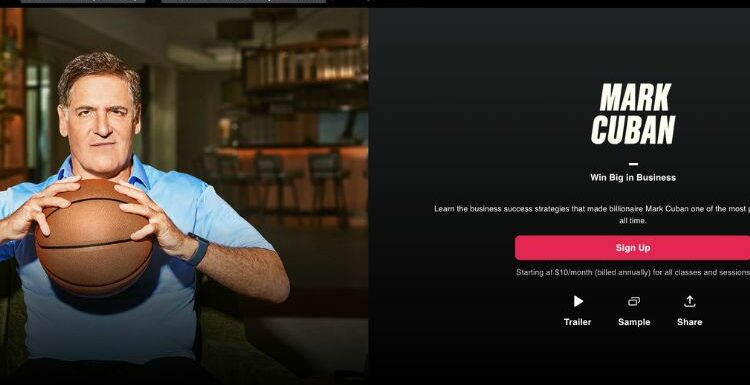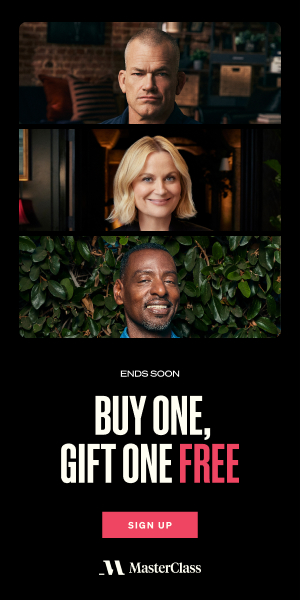In this review, we’ll see if the Mark Cuban MasterClass lives up to its promises and delivers a course worthy of your investment.
Mark Cuban MasterClass Summary
Below is what you’ll be getting with the Mark Cuban MasterClass:
- What you’ll learn: Growing profits, crafting compelling elevator pitches, risk evaluation, and time management
- Runtime: 1 hour and 28 minutes
- Recommendation: 7/10—A rich (albeit slightly unstructured) dive into Mark Cuban’s philosophies and management approaches
Over 15 years with Shark Tank, Mark Cuban has been doing his part to help entrepreneurs reach their dreams (and generate a decent ROI for him along the way).
While this shark is leaving the tank after the show’s 16th season, he’s taking his wisdom to a new platform: MasterClass.
In his MasterClass, Cuban reaches into his own portfolio to pull out case studies to talk about evaluating, honing, and committing to million-dollar ideas.
The class (titled “Win Big in Business”) also dives into the entrepreneur’s political side, revealing why he shut down the idea of running for president.
In this MasterClass Review, you’ll learn:
- What does this MasterClass promise?
- How much does Mark Cuban’s MasterClass cost?
- What is included in the Mark Cuban MasterClass?
- About the structure of the class
- Key things I learned after taking the MasterClass
- Things I liked and didn’t like about the Mark Cuban MasterClass
- Is Mark Cuban’s MasterClass worth the money?
Quick Q and A
Yes, you can’t access Mark Cuban’s MasterClass without a subscription. Jump to the pricing section to learn more.
The “Win Big in Business” class clocks in at 1 hour and 28 minutes, spanning 10 video lessons.
Yes, if you’re not happy with the subscription, you can cancel it and get a refund. Just make sure you do it within 30 days.
The MasterClass could potentially be valuable for aspiring entrepreneurs looking to embrace the “disruptor” mindset.
About Mark Cuban

Self-made billionaire entrepreneur, inventor, producer, and three-point shooter—Mark Cuban is a man of many titles.
How and where did it all begin?
Mark Cuban was born in 1958 in Pittsburg to a middle-class family, and it didn’t take long for his entrepreneurial spirit to start shining.
When he was only 12, he took his first “job” because he wanted to buy new shoes (but this anecdote is part of the course, so I won’t spoil it here!). Later, he’d earn money by selling stamps, baseball cards, and even dance lessons.
The little kid was so interested in business that he didn’t mind staying in to read about Ted Turner when his friends were out doing teenage stuff.
Cuban eventually got a “traditional” job at a software retail store. Being the crafty salesman he is, he managed to close a $15,000 deal. Sounds impressive, doesn’t it?
Well, his boss wasn’t impressed one bit. He fired him instead.
For some reason, the boss (who looked the part but lacked initiative) thought that his employees should obey orders instead of chasing opportunities, even if they ended up benefiting the company.
This taught Mark Cuban one important lesson: To care about the result, not appearances. From there, “sales cures all” sort of became a mantra for him.
Soon, he was forming his own consulting business, Micro Solutions, which he sold for $6 million. His next company (Broadcast.com) took his status from millionaire to billionaire.
By 2000, Mark Cuban was ready to monetize his passion for sports. He saw the potential in the Dallas Mavericks and realized he could do a better job managing the club. That’s what he did after buying the controlling stake in the Mavs for a whopping $285 million.
The entrepreneur also has had his fair share of TV success, from his long tenure on Shark Tank’s panel (where he invested around $29 million) to a brief appearance as a Dancing with the Stars contestant.
Today, the man is worth over $5 billion and has investments in a lot of industries.
The simplest way to describe him is to say he’s a grinder. And a successful one at that.
“I create offbeat advice; I don’t follow it. I rarely take third-party advice on my investments.”
What does this MasterClass promise?
Right off the bat, Cuban makes three big promises:
- Teaching business owners how to find their “edge.”
- Sharing all the “little things” you won’t learn in business school.
- Teaching you how to turn ideas into a company.
So, did Mark Cuban live up to his promises? Did he meet my expectations? I’ll cover that at the end of the review (feel free to skip ahead if you want to find out). But now, let’s talk about what’s probably on your mind…
How much does Mark Cuban’s MasterClass cost?
“Win Bin in Business” isn’t available for sale as a standalone course. To view the material, you have to subscribe to a MasterClass plan that covers full-length courses.
For reference, the platform offers three subscription tiers:
| Individual/Standard | Individual/Standard | Duo/Plus | Family/Premium |
| Monthly Price (Billed Annually) | $6 | $15 | $20 |
| Household Devices | 1 | 2 | 6 |
| Offline viewing | No | Yes | Yes |
What is included in the Mark Cuban MasterClass?
Here’s a rundown of what you’re getting with the Mark Cuban MasterClass:
| Runtime: | 1 hour and 28 minutes |
| Reviews: | 4.7 out of 5 stars ⭐️ |
| Lessons: | 10 video chapters |
| Materials: | none |
Runtime
Mark Cuban’s MasterClass clocks in just under an hour and a half. Compared to other classes in the “Business and Entrepreneurship” category, the content is close to Mellody Hobson’s course on strategic decision-making but much shorter than Bob Iger’s MasterClass (2+ hours).
While it’s technically possible to watch the course at 1.5x speed and get it over within an hour, I recommend sticking to 1x or 1.25x tops. Most lessons are already fast-paced.
About the structure of the class
Mark Cuban’s MasterClass is split into 10 video chapters, covering business management tips and case studies.
Lesson plan:
- Keys to Getting Started: Foundations for Starting a Business
- Broadcast.com: Building Equity
- Shark Tank: Taking Bets on Great Ideas
- The Mavs: Building a Culture to Drive Success
- Cost Plus Drugs: Disrupting Legacy Industries
- Fireside: Building Around Communities
- Market Smarter
- Evaluating Risk: Being All in
- Be Unconventional
- Maximize Your Success: Exit Strategies & Making an Impact
Lesson summary:
Mark Cuban begins his course with the basics: sales, margins, and profits. You know, the stuff that makes a successful business. However, he thinks people get too stuck on the metrics.
Apparently, Cuban isn’t a huge fan of buzzwords, at least not the generalized ones. “KPIs,” in particular, seem to annoy him. To this Dallas billionaire, nothing beats good old continuous evaluation (and a bit of reading) based on the business plan.
While we’re on the topic of plans, Mark Cuban takes the chance to tell us about his first “real” business, selling garbage bags door-to-door. If there’s one thing he’s learned from that experience it’s to put himself in the customers’ shoes.
Of course, Cuban has way more business skills than just sales, and he takes the time to share these skills and explain why they’re vital for running a business efficiently.
Now, the core of the class is six case studies. The first case study comes in chapter two, as he uses Broadcast.com to discuss how to outsmart your competitors.
Since Cuban managed to sell this business for $5.7 billion, there’s a lesson about preserving equity to learn here. But he is still aware that luck and timing (the sale was at the height of the dot-com bubble) played their parts.
Chapter three, however, is what most fans will be waiting for—you’ll meet real-life contestants from Shark Tank. You’ll also see why, as a shark, Mark Cuban is usually skeptical of pitches that rely heavily on “total addressable market” projections.
Lesson four is all about Cuban’s times with the Dallas Mavericks and how he saw a symbiotic relationship between ticket sales and court performance.
More people cheering in the arena = Better energy = More people want to play for the team
How did he get more people in the arena? He’s happy to tell you that the key was direct sales!
Side Note: Despite the recent sale, Mark Cuban still owns 27% of the team and overseas basketball operations.
Not all of Cuban’s enterprises are in entertainment, though. In chapter five, things take a serious turn as he discusses his industry-disrupting healthcare business, Cost Plus Drugs, built mainly on the idea of transparency.
Similar industry-disrupting ideas will pop up in chapter six as the class material moves on to Fireside, an interactive streaming platform co-founded by Mark Cuban and Falon Fatemi (she’s in the course, too!).
However, one of the best parts of the course is chapter seven, where Cuban shares tips from his smart marketing approaches. Buying sales? A major no-no. Forced branding? Counterproductive. PR? He does it himself. Ad spend? As low as can be.
Lesson eight expands on a couple of ideas that Cuban has made very briefly early in the course, namely that time is a valuable asset and that you’ve got to be willing to commit. Here, he gives you a taste of what going all in looks like for business owners and their families.
Cuban also addresses one concern I’ve had all along: How does he get the time for all this? The answer is email, apparently. Instead of wasting time on one-on-ones, he does most of his communication via email. This also means he gets easy access to the information later. Smart!
Finally, the billionaire entrepreneur talks exit strategies, showing us the difference between financial and strategic buyers. He also briefly discusses income inequality, stock options, and appreciable assets.
My fast-track lesson plan:
The MasterClass chapters are already bingable. However, if you want an abbreviated lesson plan, here are the videos I’d recommend watching:
- Keys to Getting Started: Foundations for Starting a Business
- Broadcast.com: Building Equity
- The Mavs: Building a Culture to Drive Success
- Cost Plus Drugs: Disrupting Legacy Industries
- Market Smarter
- Maximize Your Success: Exit Strategies & Making an Impact
Total runtime = ~55 minutes
Key Things I Learned
The content is full of anecdotes from Mark Cuban’s life, but he also gives out a lot of practical tips along the way.
Below are a few key learnings that stood out during the MasterClass:
- Everyone needs a bit of luck to make their first billion.
- Selling isn’t convincing—it’s helping.
- Entrepreneurs should be able to read balance sheets, put market plans together, and analyze statistics.
- You shouldn’t be dogmatic about your business plan.
- Never let the total addressable market size blind you when evaluating a business idea. Instead, consider if you can sell the product enough to make it worth your time.
- Infotainment pitches usually work like a charm.
- Not cutting the in-store promotions from your margins is lying to yourself and your investors.
- There are a lot of perks in opting for direct sales.
- As the business grows, it’s important to hire slowly and fire quickly.
- Trying to force a brand image backfires sometimes.
- Risk evaluation is mostly about figuring out if you’re all in.
- Look for a strategic buyer for your business rather than a financial one.
Things I liked about the Mark Cuban MasterClass
The thing I liked the most about Mark Cuban in this MasterClass is his no-nonsense style, which is admittedly what I loved about his appearances on Shark Tank. He’s here to share some insights, and he’ll do it as directly as possible.
I also love how he balances between showing off (and how could you not show off with this much wealth?!) and keeping it real. He acknowledges that got lucky and had great business partners. He also doesn’t mind admitting he’s bad at something.
My favorite quotes from Mark Cuban’s MasterClass:
- “My dad would always tell me your most valuable asset is your time. And it’s perishable.”
- “But having failed enough, I learned that no one remembers my failures.”
- “The only reason you know who I am is because I have billions of dollars. And the only reason I have billions of dollars is because I didn’t immediately go out and raise money.”
- “The NBA isn’t in the business of basketball. We’re in the business of experiences.”
- “You can’t create a business that’s just going to suck money just because you’re passionate about it. They call those charities.”
Things I didn’t like about the Mark Cuban MasterClass
For the most part, the chapters feel like disjointed lectures about Mark Cuban’s enterprises. I would have loved to see a clear framework tying all the lessons together.
There’s one tiny hiccup to clear here, too.
Mark Cuban’s comment about how networking is great for sales and job hunting but not so much for business insights might rub people the wrong way.
According to him, rich people won’t give you their best ideas. By that reasoning, someone might assume that Cuban isn’t giving us his best insights in this MasterClass, either. But it’s important to remember that he never promised any money-making ideas in the first place!
Does the class keep its promises?
Mark Cuban made three main promises at the beginning of the course. Did he fulfill them?
Yes, yes, and no.
He urges the audiences to be disruptors and lets them know exactly what he thinks “disrupting” an industry looks like with examples. This could light some light bulbs in an entrepreneur’s head and put them in the right mindset. That’s the “edge” promise covered.
As for the “little things” that business school doesn’t teach, he offers pragmatic, ground-level guidance on topics like marketing and time-efficient communication. Another tick.
But it’s with the last promise that things take a turn. This isn’t the course to go to if you want a comprehensive guide on turning an idea into a full-fledged company.
Mark Cuban isn’t here to walk you through a step-by-step process. And he’s definitely not here to give you a business idea or a shortcut. He’s just here to share tidbits from his strategy here and there.
I expected that from the get-go and wasn’t disappointed. After all, he did make it clear (even long before the course went live) that folks with great business ideas won’t share them with you—they’ll keep the ideas to themselves and make oodles of money off of them.
Someone who didn’t know the entrepreneur embraced this line of thought could end up disappointed.
Is Mark Cuban’s MasterClass worth the money?
Yes, if you…
- Are an aspiring entrepreneur looking for inspiration
- Need a fresh perspective on evaluating business ideas
- Have read “How to Win at the Sport of Business” and want more insights from Mark Cuban
No, if you…
- Are looking for a highly technical guide on turning ideas into businesses
- Want to learn more about the general business metrics and theories
Conclusion
All things considered, Mark Cuban’s MasterClass is an engaging, fast-paced, but not too technical introduction to the world of entrepreneurship.
If you’re interested in learning more, here’s the trailer for the class:


